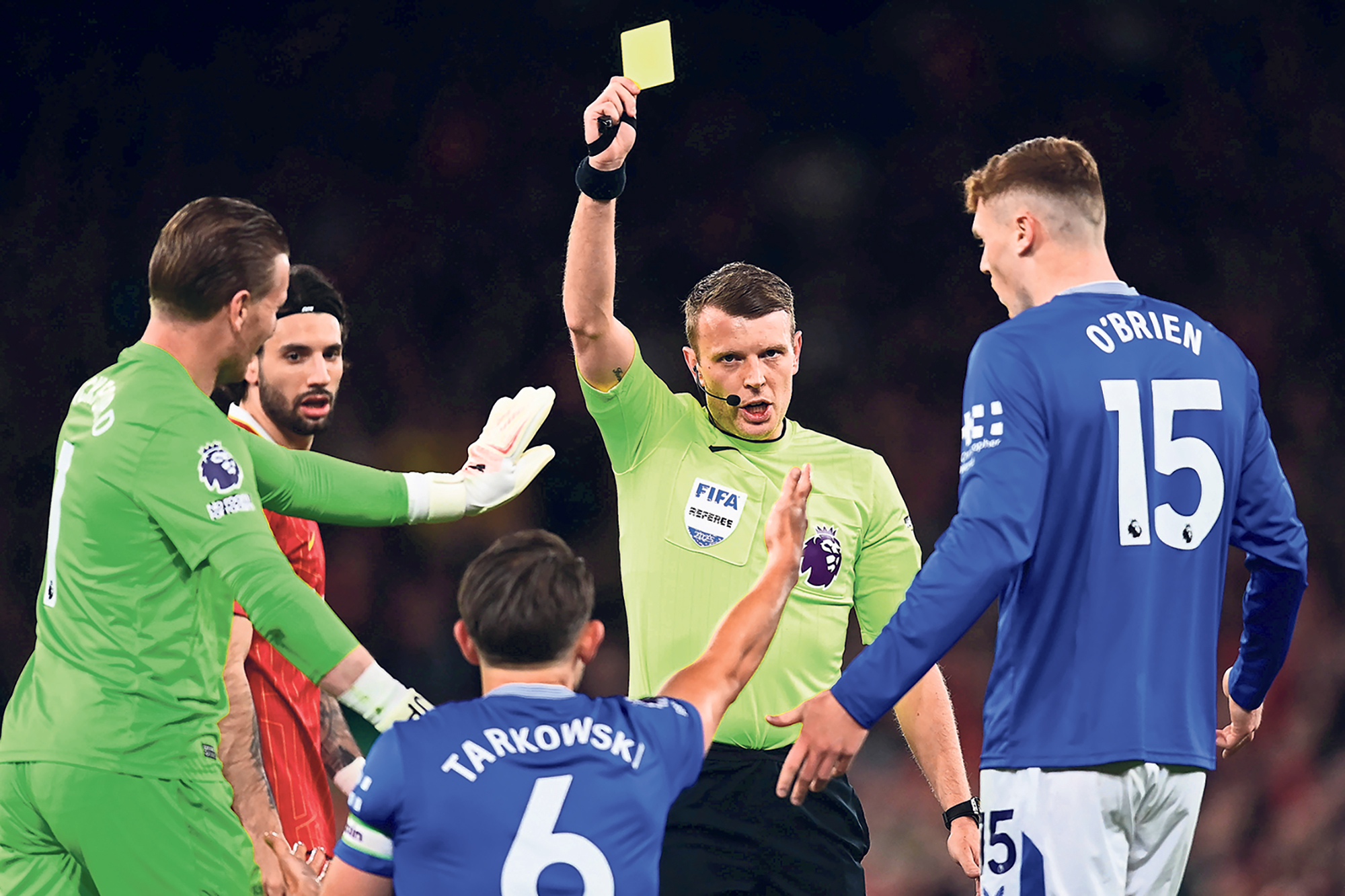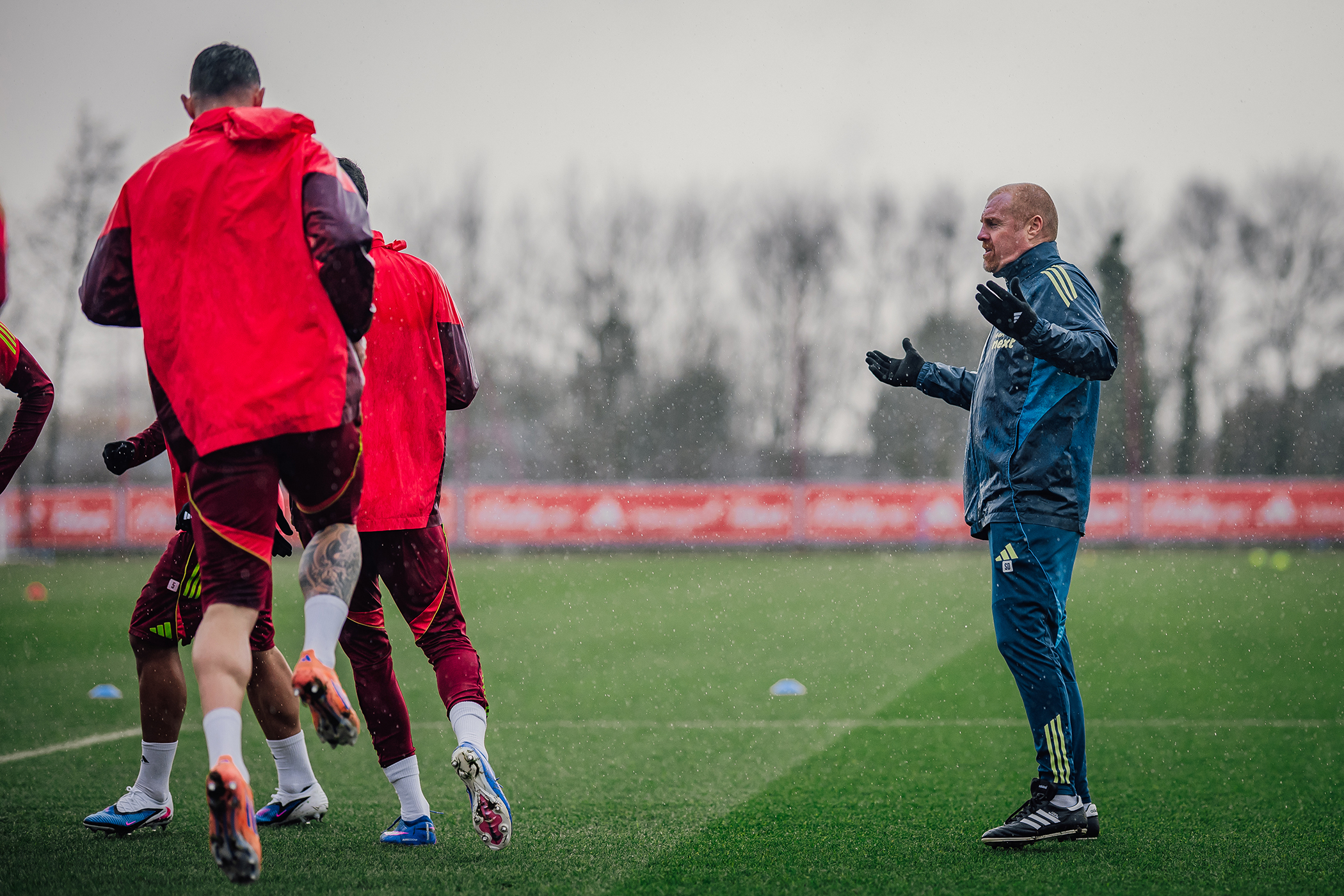In Brazil, they say it is “andando na corda bamba”. In Spain, “estar en la cuerda floja”. Both phrases translate literally into the English language idiom of walking along a tightrope, playing football having already received a yellow card. In France, the player is said to be on probation, awaiting sentencing – “être en correctionnelle” – while a German commentator will say “tanzen auf der Rasierklinge”, or dancing on the razorblade, and a Welsh speaker will say “dawnsio ar y dibyn” – dancing on the edge.
All across the world, the imagery changes. But the messaging in football parlance remains the same – the player’s name has been taken, they are treading on dangerous ground, and they are required to watch their step. Some are more successful than others.
“Firstly, I think if there’s a big gap between the offences, that can help,” said former Premier League referee Graham Scott. “If your first yellow card comes in the 15th minute and then you commit another foul in the 18th, it looks like you haven’t taken on board the caution you’ve just had.
“Beyond that, it’s about not being in the referee’s ear for the next half an hour because you’ll just annoy him at that point and he’s more likely to take it against you. It’s much better to have a quiet spell in the game, disappear from view, and just get on with the match.
“If a player has been respectful, maybe has apologised, maybe has acknowledged their error, then you’re more likely to think favourably of them if they then commit an offence. You’re more likely to just tip into the side of – OK, this player gets the benefit of the doubt in a way that maybe someone else might not.”
Last season, Everton’s James Tarkowski made headlines for breaking a Premier League record of 63 bookings without a sending-off. Tarkowski, however, had already been dismissed three times in the lower leagues for Brentford and Oldham, and so the Premier League player with the most career bookings without a red card is Crystal Palace’s Will Hughes, whose 86 bookings include four in his first eight games of this season.
“I think a lot of them have been necessary,” said Hughes, who plays as a defensive midfielder by trade. “Look at the quality that we’re playing against week after week. There’s going to be times in games when top players get past you.”
Some credit must also be given to Palace’s manager, Oliver Glasner. Hughes recalls one particular match at Stamford Bridge last season, where he played directly against Cole Palmer and carried a caution from the 13th minute. Glasner substituted him five minutes into the second half. “He’s quite astute at bringing me off,” said Hughes wryly. “That always helps.”
If walking the tightrope is an art form, Corry Evans is one of its masters. The ex-Sunderland, Blackburn Rovers and Oldham Athletic midfielder holds arguably the most impressive disciplinary record in all of the English Football League. Assuming that all of his bookings were on average about the 60th minute, Evans’s 93 bookings equate to spending more than 9% of his entire club career, or 2,790 minutes – more than half an entire season of football – en correctionnelle without receiving a red card. “I don’t know whether that’s an impressive thing or if it’s a bad thing,” he said.
You have to have a bit of the dark arts about you, play along with the referees
You have to have a bit of the dark arts about you, play along with the referees
Corry Evans
When I first shared the news of his unlikely title with him via email, it was immediately forwarded to his brother and dad, who had long teased Evans for his high number of yellow cards.
Newsletters
Choose the newsletters you want to receive
View more
For information about how The Observer protects your data, read our Privacy Policy
Like Hughes in the Premier League, the majority of Evans’s cautions came in the middle of the pitch with inoffensive, tactical fouls. “I think you’ve got to have a bit of the dark arts about you,” he said. “You have to play along with the referees as well.” As for Hughes’s relationship with the officials, he’s “always been quite smart in that sense”, too.
In German football, a common term for a player on a booking is “gelb vorbelastet” which translates literally to “pre-loaded yellow”. For Frank Greiner, who played in the Bundesliga for 15 seasons around the turn of the century, the phrase “pre-loaded” could hardly be more apt. He was booked in more than a quarter of his professional appearances. And yet only once, in an amateur game, was he dismissed. It was his 422nd match.
Greiner’s compatriot Mirko Votava went one step further. He played with a steady, industrious persistence and a well-groomed pencil moustache – the kind of man who made the most sense in the 1970s. And the 1980s. And for most of the 1990s, too. His career lasted for 25 consecutive seasons of football, populated by 104 separate bookings and not a single dismissal in all of those years. An equivalent career that began this season would end in the year 2049.
Votava’s thoughts on football were philosophical in their eloquence. “If football didn’t exist, it would simply have to be reinvented for me,” he said in 2016. “A life without football would be possible – but pointless.”
I pestered press officers at his previous clubs, trawled through online forums, and stalked doggedly through dormant Facebook accounts before eventually guessing at what I hoped might be his email address. Votava was the truest, most experienced, most consistent “Meister der Rasierklinge”. And yet still I had no luck.
But just two days before filing this article, I struck gold. A message came through to my WhatsApp and the master of the tightrope divulged his great secret: “I tried to win the ball without committing a foul.”
Perhaps, in hindsight, I may have been overdoing it, or as they say in Germany, “den Bogen überspannen”.
Photograph by Richard Martin-Roberts/CameraSport via Getty Images


